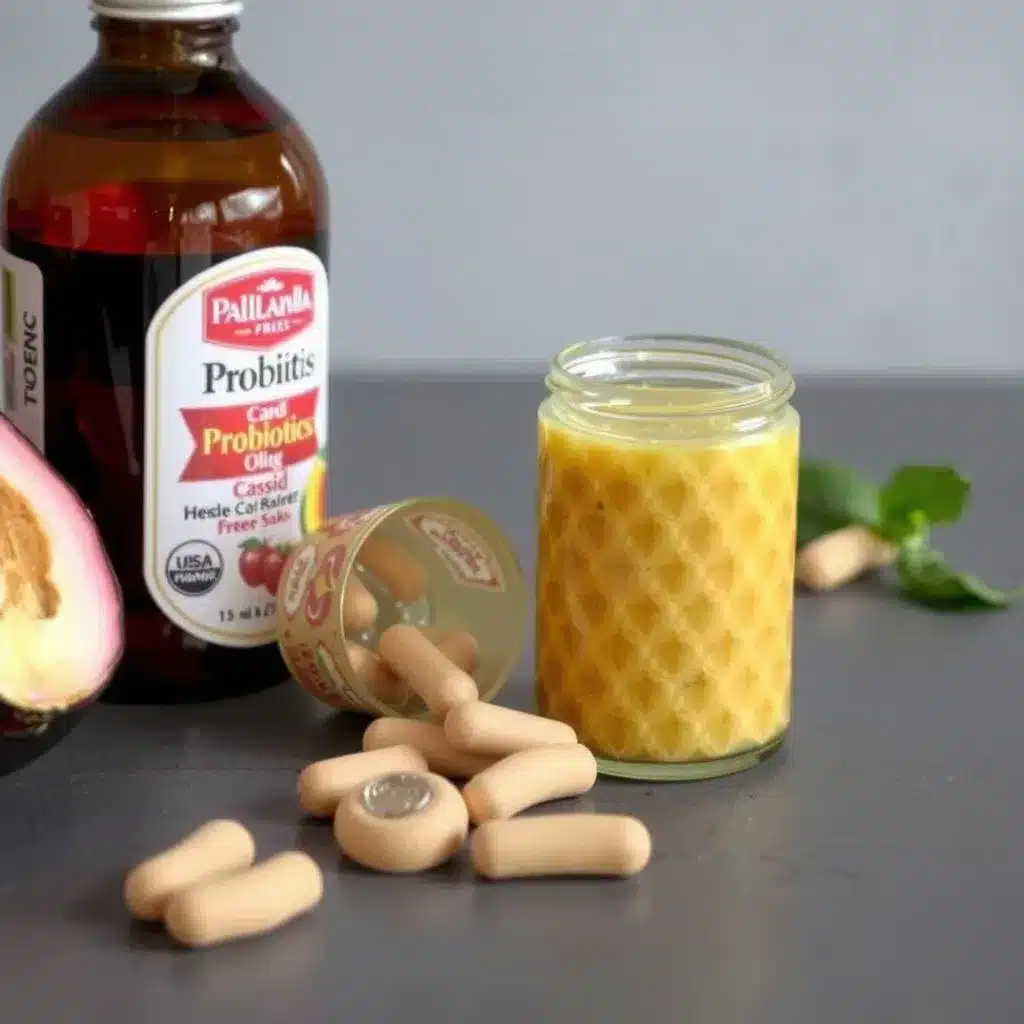Table of Contents
The human gut is a thriving ecosystem, home to trillions of bacteria, fungi, viruses, and other microorganisms collectively known as the gut microbiome. This microbiome plays a crucial role in digestion, immune function, metabolism, and even mental health. Among the most studied interventions that affect the gut microbiome are probiotics and antibiotics. Both of these can have profound effects on the balance of bacteria in your gut, but they do so in vastly different ways.
In this article, we’ll explore the differences between probiotics and antibiotics, how they impact your gut microbiome, and why maintaining a balanced microbiome is essential for overall health. We’ll also take a look at how probiotic supplements may help restore balance after antibiotic use.
What are Probiotics and Antibiotics?
Before diving into their effects on the gut, it’s important to understand what probiotics and antibiotics are and how they work.
Probiotics
Probiotics are live microorganisms—often bacteria or yeasts—that provide health benefits when consumed in adequate amounts. They are commonly referred to as “good” or “friendly” bacteria because they help maintain the natural balance of organisms in the gut. The most commonly used strains of probiotics are from the Lactobacillus and Bifidobacterium families, although other strains like Saccharomyces boulardii (a yeast) are also used in certain supplements.
Probiotics help replenish and maintain a healthy microbiome by increasing the population of beneficial bacteria, aiding in digestion, supporting the immune system, and even helping to produce essential vitamins. Probiotic-rich foods include yogurt, kefir, sauerkraut, kimchi, and other fermented foods.
Antibiotics
Antibiotics, on the other hand, are drugs used to treat bacterial infections by killing or inhibiting the growth of harmful bacteria. While antibiotics are incredibly effective in treating bacterial infections, they do not differentiate between harmful and beneficial bacteria, which means they can disrupt the balance of the microbiome.
Antibiotics work by targeting specific components of bacterial cells, such as the cell wall or protein synthesis machinery. However, this broad-spectrum action can lead to the unintended consequence of eliminating beneficial bacteria in the gut, leaving room for opportunistic pathogens to proliferate.
How Antibiotics Affect Your Gut Microbiome
When you take antibiotics, they work to eradicate harmful bacterial infections in your body, but they also affect the delicate balance of your gut microbiome. Here are some ways antibiotics impact gut health:
1. Disruption of Microbial Balance
Antibiotics are not selective in their actions; they can kill both harmful and beneficial bacteria. This disruption in the balance of good and bad bacteria is known as dysbiosis. Dysbiosis can result in a reduction of microbial diversity in the gut, which is a key factor in maintaining a healthy gut microbiome.
Several studies have demonstrated that antibiotics can lead to long-lasting changes in the gut microbiome. For instance, a study published in Nature Microbiology found that even after a single course of antibiotics, significant changes in the composition of gut bacteria were observed, with some species being reduced in numbers or even eliminated entirely (source: Nature Microbiology, 2017). This disruption can lead to various gastrointestinal issues such as diarrhea, bloating, and abdominal discomfort.
2. Increased Risk of Infection
Antibiotic-induced dysbiosis can also make the gut more vulnerable to infections. When beneficial bacteria are wiped out, harmful bacteria, such as Clostridium difficile (C. diff), can proliferate and cause infection. This is why antibiotic-associated diarrhea (AAD) is a common side effect of antibiotic use. In more severe cases, C. diff infections can lead to colitis, a serious condition that causes inflammation of the colon.
3. Long-Term Consequences
The long-term effects of antibiotic use on the microbiome are still being studied, but evidence suggests that repeated or prolonged use of antibiotics can have lasting impacts on gut health. A study in Cell Host & Microbe found that repeated antibiotic use could lead to irreversible changes in the gut microbiome, making it harder for the body to restore the original microbial diversity (source: Cell Host & Microbe, 2015).
How Probiotics Affect Your Gut Microbiome
In contrast to antibiotics, probiotics work to promote gut health by replenishing beneficial bacteria and restoring balance to the microbiome. Here’s how probiotics can help:
1. Restoring Balance After Antibiotic Use
One of the most common uses of probiotics is to restore balance to the gut microbiome after antibiotic treatment. As antibiotics can kill both harmful and beneficial bacteria, probiotics can help repopulate the gut with helpful bacteria. This is particularly important in preventing and treating antibiotic-associated diarrhea (AAD).
A study published in The Lancet Infectious Diseases demonstrated that probiotics significantly reduced the incidence of AAD in people taking antibiotics (source: The Lancet Infectious Diseases, 2012). The probiotics, particularly those containing strains like Lactobacillus rhamnosus and Saccharomyces boulardii, can help counteract the negative effects of antibiotics by supporting the growth of beneficial gut bacteria.
2. Improving Digestive Health
Probiotics are also beneficial for general digestive health. They help with the digestion of certain foods, produce short-chain fatty acids (SCFAs) that nourish the gut lining, and support the overall health of the intestines. These SCFAs also play a key role in regulating inflammation in the gut, which can help prevent chronic gastrointestinal conditions like irritable bowel syndrome (IBS).
3. Supporting the Immune System
The gut is home to a significant portion of the body’s immune system. Probiotics can help support immune function by enhancing the activity of immune cells such as macrophages and T lymphocytes. They also help maintain the gut barrier, preventing harmful pathogens from entering the bloodstream. This makes probiotics not only beneficial for gut health but also for overall immune support.
4. Promoting Microbial Diversity
A healthy gut microbiome is characterized by a diverse array of microorganisms. Probiotics help promote this diversity by introducing a variety of beneficial strains that support the growth of a healthy and diverse microbial community. This diversity is important because a more varied microbiome is associated with better overall health, including improved digestion, immune function, and even mental well-being.
5. Mental Health Benefits
In addition to supporting gut health, probiotics have been shown to have a positive effect on mental health by influencing the gut-brain axis. Studies have demonstrated that certain probiotic strains can help reduce symptoms of anxiety and depression by influencing neurotransmitter production and reducing inflammation. This growing area of research suggests that probiotics might be an important tool not just for digestive health, but also for supporting emotional well-being.
6. Probiotic Supplements and Bioma Health
Probiotic supplements like those offered by Bioma Health provide a convenient way to support gut health, especially after antibiotic use. Bioma Health’s products are formulated with scientifically-backed strains designed to help restore balance to the microbiome, support digestion, and improve overall well-being. However, as with any supplement, it’s always recommended to consult with a healthcare professional before starting a new regimen, especially if you are recovering from an illness or antibiotic treatment.
Key Differences Between Probiotics and Antibiotics
To summarize, here are the key differences between probiotics and antibiotics and how they affect the gut microbiome:
| Probiotics | Antibiotics |
| Promote the growth of beneficial bacteria | Kill both harmful and beneficial bacteria |
| Help restore balance after antibiotic use | Can lead to gut dysbiosis (imbalance of good and bad bacteria) |
| Support digestive health and immune function | Can disrupt digestion and lead to antibiotic-associated diarrhea (AAD) |
| Enhance microbial diversity in the gut | May reduce gut microbial diversity |
| May have positive effects on mental health via the gut-brain axis | Can lead to inflammation and increased vulnerability to infections like C. difficile |
Conclusion
Both probiotics and antibiotics have significant effects on the gut microbiome, but they work in fundamentally different ways. Antibiotics, while critical for fighting infections, can disrupt the delicate balance of gut bacteria, leading to digestive issues and an increased risk of infections. Probiotics, on the other hand, help restore balance to the gut microbiome, supporting digestion, immune function, and overall well-being.
If you’ve recently taken antibiotics, supplementing with probiotics from trusted brands like Bioma Health can help replenish beneficial bacteria and restore balance to your gut. As we continue to understand more about the intricate relationship between the gut and the brain, probiotics may prove to be not only a solution for digestive health but also a valuable tool for supporting mental well-being. Always consult a healthcare provider before starting any new supplements, especially after a course of antibiotics.



